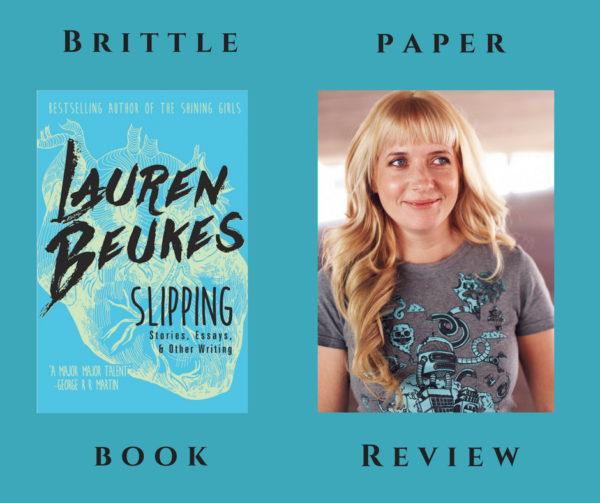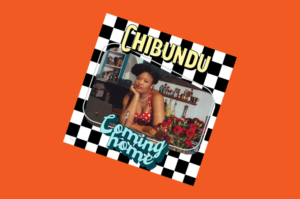Lauren Beukes loves dystopia, or has at least has spent a lot of time thinking about it. A number of stories in her latest collection, titled Slipping, examine dire futuristic scenarios, from hyper-commercialization of television to exploitative medical sciences to biotech advertising to air travel — all of them packing sufficient decibels of discomfiture, in sentences and scenes. Take for example this scene from the headlining story “Slipping.”
“Let me,” Tomislav says, kneeling between her legs. She holds her flesh open while he reaches one hand up inside her abdomen. It doesn’t hurt, not anymore. The velcro releases a local anesthetic when it opens, but she can feel an uncomfortable tugging inside, like cramps. Tomislav twists off the valves on either side, unplugs her stomach and eases it out of her. He sets it in a sterile biobox and connects it to a blood flow. By the time he turns back, she is already spooling up the accordion twist of artificial intestine, like a magician pulling ribbons from his palm. It smells of lab-mod bacteria, with the faintest whiff of feces. She hands it to Tomislav and he wrinkles his nose. (“Slipping”)
Often, while reading, I returned to the dictionary to update my recollection of what the word dystopia means in relation to the author’s overwhelming direction. The internet helped: “a place or state in which everything is unpleasant or bad, typically a totalitarian or environmentally degraded one.” Yes, that is it.
Yet what is impressive with the telling of each story in the collection is the earnestness that underlies the dense and layered prose that Beukes brings to bear on her depiction of a world in which most would loathe to live. After a bit of discomfort, one begins to expect it, to get familiar with it, to realize that this distress caused by uncomfortable imagination is necessary in preparing for the worst or preventing it. The stories also do more than discomfort, though they do that in excess.
Who thinks this much about dysfunction, and why? Or why not? Beukes is from South Africa, exposed daily, perhaps, to some milder or worse form of this anticipated disaster. I live in Nigeria which is no better, but no less dystopian sometimes even in the present reality. So why aren’t there more stories of this nature, fictionalizing our worst fears, entertaining us with our surrounding and impending catastrophes? It’s Beukes’ fault that I’m now looking for more work in this direction. Not too far from reality to be mere sci-fi nor flighty enough to be just fantasy, dystopian fiction presents real possibilities in the most extreme light and reflects it back to in all its absurdity.
In one story, “Branded,” advertising companies have figured a way to promote their products by branding it on luminous flesh of the human billboard on whose arm the logo glows as the human consumes the liquid product. This way, who needs to buy soda when one can get a lifetime supply free of charge for a “small” cost of permanent flesh disfiguration.
In another story, describing another future eventuality, companies evolved disposable human-machine mutants whose cost to maintain keeps the bottomline under manageable control. One might say that noticeable milder variations of these already exist. Another one, “Tankwa-Karoo” is a story of a dystopian Island during a made-up civil war with characters as hippies, thugs, deejays and drone operators, sometimes too dense to make sense of, as a few of the stories were.
You get the idea.
But they are not all futuristic, and not all inscrutable though the cultural and linguistic landscapes of a number of them had me painfully scrambling. The author, occasionally, indulges the reader’s fantasy in more vividly recognizable scenarios. For instance, in “Smileys,” a story named after a type of spicy finger snack made from the head of a pig, a trader successfully turns on a suspected robber around whom she had began to feel threatened after a few minutes of conversation, or “Easy Touch” in which a prospective victim of cyber crime easily turns the table on her online fraudster. In “Dear Mariana”, an epistolary work, a lover pens a letter to her lover/friend using her abandoned typewriter. The presence of carefully-placed typos in the work, as one would find in a real life typewritten work, makes the story both recognizable and relatable.
In “Pop Tarts” a reality TV star takes too far his unquenching desire to simulate “reality” for the big screen, and in “Exhibitionist,” an art exhibition turns into a gory scene of blood and death. “My Insect Skin,” one of my favorites in the book, is a story about a woman having a miscarriage in a public bathroom; graphic and affecting. In “Parking”, a traffic marshal, Nikolas van Rooyen, gradually transforms into a stalker in love, and a frustrated lover. And “Princess” is a beautiful and relatable story from start to finish, an allegory on vanity and vulnerability, with a rare happy ending for an “African story.” (Don’t take me up on this. There’s a whole thriving debate, online, on this characteristic of the modern African short story.)
In short, the book is a collection of a range of emotions, experiments, and statements, from serious subject matters and traditional writing genres, to stories with lighter notes and more risk-taking styles. I particularly enjoyed “LitMash,” a genre mashup of real twitter stories, which reminds, in some way, of Small Fates. “Algebra,” another one, is an alphabetical detailing of an unfurling relationship through thick and thin. The disproportionate number of dystopian fiction in the book compared to other “normal” familiar ones leads me to believe that Beukes would prefer that this be the overarching descriptor for the book, and I’ll gladly oblige.
However, I should note that not all the work in the book are fiction. In the lower third of the book, Beukes shares a few nonfiction journalistic pieces from work done around Johannesburg and environs, completing the tripod of this at times strange, at times frustratingly dense, at times delightful book. One particularly successfully work straddles the median of these genres, requiring regular re-reads to figure out whether the correspondent “Lauren Beukes” referred to at the beginning, embedded with a deep state security agency, and exposed to their damning secrets as they try to “protect” the South African population is the author herself on a journalistic assignment or an invented one. The piece, called “Riding with the Dream Patrol,” was hard to figure as either a part of the continued dystopian theme or a reflection of already existing reality. What do we call this ambiguity? Art? Disruption?
The subject matter of the majority of the stories in the book, a noticeable focus on the future of technology invites imagination but no subscription to any particular continental political cause. So, those invested in the question of themes in contemporary African fiction will find a lot to love in Beukes’ relevant unconventionality. What the work avoids in identifiable marker to specific literary style and contemporary themes on the continent, it makes up for in inventive experimentations. A few sentences below tickled my reading bone:
“The wind battering against the flagpoles of the hotel across the road has chipped the sea into dark and angry little caps.”
“It should come as no surprise that the princess found her pea, not beneath the tethering pile of mattress, quilted and cotton-rich, with pocket coils and high density foam, but nested among the wiry coils between her leg.” (Kindle location 794)
What cannot be taken away from this offering is a transparent commitment to storytelling in very different forms. There is a perennial conversation about the delineation, or otherwise, between fiction and nonfiction. What Beukes invites by publishing these two genres together in one book is to continue to stimulate that conversation. A journalist is a writer even when telling a personal, a reported, or an invented story. Sometimes, unless explicitly stated, the difference isn’t obvious, and sometimes doesn’t much matter.
BUY Slipping: Stories, Essays, and Other Writings
****************
About the Author:
 Kọ́lá Túbọ̀sún’s work has appeared in Aké Review, Brittle Paper, International Literary Quarterly, Maple Tree Literary Supplement, and recently in Literary Wonderlands, an anthology edited by Laura Miller. He is the winner of the Premio Ostana “Special Prize” 2016 (awarded in Ostana, Cuneo, Italy) for his work in indigenous language advocacy.
Kọ́lá Túbọ̀sún’s work has appeared in Aké Review, Brittle Paper, International Literary Quarterly, Maple Tree Literary Supplement, and recently in Literary Wonderlands, an anthology edited by Laura Miller. He is the winner of the Premio Ostana “Special Prize” 2016 (awarded in Ostana, Cuneo, Italy) for his work in indigenous language advocacy.










My Books of 2017 « ktravula – a travelogue! December 09, 2017 08:38
[…] Slipping by Lauren Beukes […]